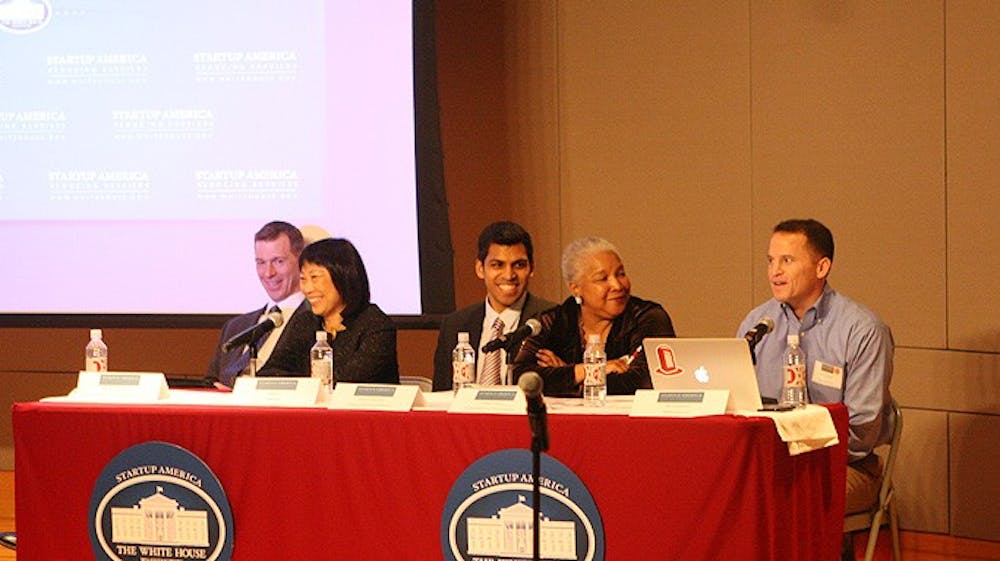Representatives from the Obama and Small Business administrations gathered in Durham to launch “Startup America”—a campaign that seeks to forge ties between government officials and entrepreneurs to spur innovation.
In what N.C. Secretary of Commerce Keith Crisco called a “great day for North Carolina,” about 150 local businessmen and federal officials assembled to kickoff Startup America’s tour of eight different U.S. cities. The campaign was launched at the North Carolina Biotechnology Center, an organization that provides loans and investments to entrepreneurs.
“After over 50 years in what used to be a pine forest, entrepreneurs and business leaders [have come] together to talk about economic start-ups and dreams, which [has] resulted in a massive increase in opportunity for the people of North Carolina,” Crisco said.
The goals of Startup America are to create jobs, spur innovation, reduce barriers to growth and increase access to capital, Crisco said. With three internationally recognized research institutions and a rich climate for entrepreneurship, Durham served as an ideal place to kickoff the initiative, said Lee Buck, partner and advisor of LaunchBox Digital. Buck said the program hopes to emphasize the idea of entrepreneurship as a “core American value” by collaborating across the public and private sectors.
Representatives of the Obama administration plan to revamp the country’s 52-year-old business start-up initiative, Small Business Investment Companies. Although the SBIC has assisted small businesses in raising capital, it does not sufficiently promote risk-taking in entrepreneurship or job creation, Buck said.
Buck added that the initiative will inject $2 billion into small firms over the next five years through an “impact investment fund.” Once implemented, “an entrepreneurship mentor core” will pair veteran entrepreneurs with “rookies” to facilitate the spread of risk-taking experiences.
Risks that pay off
Halfway through the event, the lecture transitioned into a panel discussion, moderated by Sean Greene, associate administrator for investment at the Small Business Administration. This same event format will be used in all eight cities, so that government officials have the chance to personally interact with private entrepreneurs. The Obama administration will take feedback from these discussions to shape future economic legislation.
Panelists included Aaron Chatterji, member of the President’s Council of Economic Advisors and associate professor at the Fuqua School of Business; Michael Fitzpatrick, associate administrator of the Office of Management and Budget’s Office of Information and Regulatory Affairs; Esther Johnson, national ombudsman and assistant administrator for regulatory enforcement fairness and David Morgan, CEO of Bandwith.com.
Despite modest job growth in 2010, Chatterji believes the government must do more to support entrepreneurship, as that is traditionally where the bulk of economic growth occurs.
“If you look at the data and statistics, there are a million of jobs today that didn’t exist 10 years ago,” Chatterji said. “They didn’t have names for what we’re doing today... and the fact is almost all job growth comes from new companies.”
Fitzpatrick believes the money allocated to this initiative is being put in the right direction, as it reduces barriers to job entry. As part of the initiative, Obama asked Fitzpatrick to review pre-existing entrepreneurial regulations, and to either modify or eliminate them if they are inefficient. Fitzpatrick added that he plans to work with Greene to create a “consolidated portal”—an online forum in which business leaders can discuss effective policy measures.
Morgan believes policy should be reformed to alleviate the burden of student financial loans—noting that debt often prevents individuals from taking financial risks.
“Coming out of schools with the heavy weight of loans on their backs, young adults are deterred form taking entrepreneurial risks, costly in and of themselves, because they are told they must focus on paying back the bill of their education,” he said.
After the panel, audience members split up into small groups of four to five people and discussed specific government policies.
Although Obama representatives commended the event’s success, they believe there is still significant work ahead.
“Conversation doesn’t end with the event today,” Buck said. “We’re going to take these ideas and answers back and feed it into a greater process.”
Get The Chronicle straight to your inbox
Signup for our weekly newsletter. Cancel at any time.

